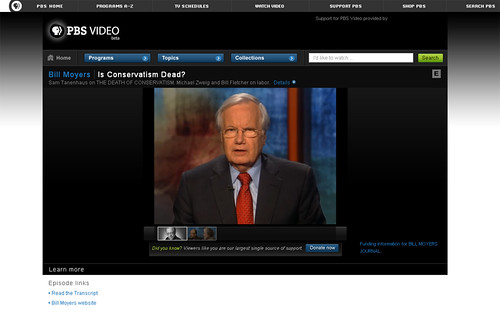This post was inspired by a video I recently watched on the web. I was tickled pink to discover that @pbs is placing their video collection online. Time and again I see PBS innovating and using technology in new and meaningful ways, and this is no exception (though, please, I want to embed, PBS!) – the video archives are rich with the kind of nerdy stuff I love to watch, including the Journal with Bill Moyers. In this clip, Sam Tannenhaus was on the program to discuss his new book, The Death of Conservatism. From Bill’s introduction:
Sam Tanenhaus edits two of the most influential sections of the Sunday NEW YORK TIMES – the Book Review and the Week in Review. He’s had a long fascination with conservatives and conservative ideas. He wrote this acclaimed biography of Whittaker Chambers, the journalist who spied for the Russians before he became fiercely anti-communist and a hero to conservatives. Now Tanenhaus is working on a biography of the conservative icon William F. Buckley JR.
They discussed the protests in Washington (teabaggers, health care reform, anti obama, glenn beck, september 2009) and I must say, Sam quite blew me away. I’m not sure I recognized all the names he mentioned, but here was a guy who knew his American political history. Wow! My first thought after the show ended was – where does THAT guy teach, I wanna go there!
And then I thought, it sure would be nice if you could choose your professors, not from the pool at your current institution, but from anywhere in the world, and perhaps even from outside academia. Why can’t we do that already? With distance being so easily mediated by technology – through video, skype, virtual worlds, podcasts, twitter, RSS – the web and all its glory, why aren’t the very BEST teachers already teaching online to reach more people, more motivated people, more motivated people willing to pay (and maybe handsomely) for their expertise? Why hasn’t this already happened?
Well, there is that pesky issue of assessment and accreditation and the institutional ballyhoo that’s tied into the “degree” but barring all that, why hasn’t some accredited, established institution emerged to facilitate this kind of customized education? MIT famously opened up their their course content, but I think we’re learning it’s not just the reading lists, powerpoint slides, and class notes that make a great class – we also need great teachers and mentors.
But what happens when you find that the great specialists in your field or area of interest aren’t AT one institution, they’re scattered all over the place? If I were going to mortgage my future for grad school, I’d really want access to the best of the best no matter where they were. Wouldn’t you?
